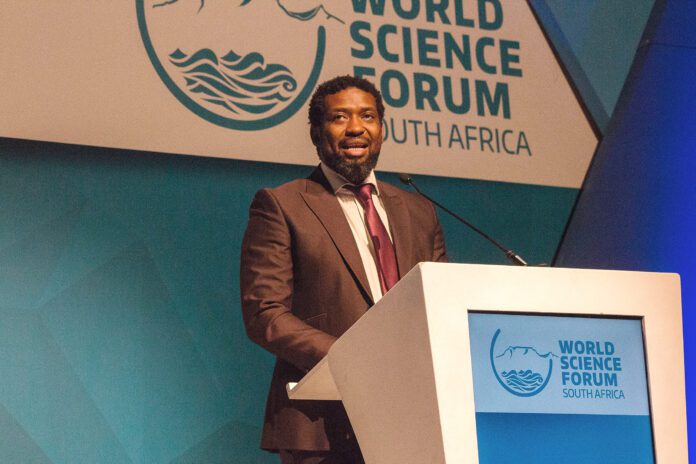The 10th edition of the World Science Forum (WSF) 2022, the first to be held in Africa, closed on Friday afternoon with a bold declaration to make science a tool for social justice.
Held at the Cape Town International Convention Centre between December 6 and 10, the gathering attracted delegates from more than 118 countries. The theme of the conference was Science for Social Justice. Over the course of four days, there were lectures and panel discussions aimed the mapping out how science could best serve everyone in society. There were also exhibitors on the ground-floor hall who showcased the work their various organisations were doing to make science a transformative tool.
Established by the Hungarian Academy of Sciences, in collaboration with the United Nations’ Educational, Scientific and Cultural Organisation (Unesco), the WSF is held every two years in different countries. Its chief mission is to deliberate on the social and economic relevance, influence and responsibilities of science. The forum creates a platform for the scientific community, public policy makers and communities to exchange ideas on the growing interdependence of science and society, and how science can help to address global challenges facing humanity.
The subthemes of this year’s WSF were science for human dignity, science for climate justice, science for Africa and the world, science for diplomacy as well as justice in science.
In his closing remarks, Buti Manamela, deputy minister of higher education, science and innovation, said: “We just concluded a highly successful forum, which was characterised by high calibre presentations and incisive debates on a number of key issues that face humanity.
“This outcome was made possible by, among others, the leadership and support of our government and international partners and the active participation of you – all forum participants coming from diverse backgrounds and representing diverse sectors.”
Throughout the three days of the conference, various speakers, on various panel discussions, made it clear that science needed to play an activist role in order to benefit everyone in society and solve myriad challenges. “One of the implications of this theme is that, in the context of our contemporary reality, science and scientists cannot afford to confine themselves to the dictates of their respective disciplines,” Manamela said. “Science and scientists must appreciate the intersectional nature of the problems that face humanity in the 21st century and they must possess a social consciousness. In essence, there is a greater need today for activist scientists.”
In the vibrant presentations and discussions, it was made clear that collaboration was vital to enable science to progress. President Cyril Ramaphosa opened the WSF on Tuesday with a challenge to delegates to ensure that the forum would not only be a platform for debate, but that it would also result in “concrete action” towards the betterment of lives and livelihoods. The president called for fair and equal access to scientific
innovations and discoveries to close the gap between rich countries and developing economies.
“Science for Social Justice expresses our conviction that inequality within and between countries is neither just nor sustainable. This event will inspire concerted global action for science to challenge and address inequality, injustice, poverty, environmental destruction and marginalisation,” he said.
“As this is the first World Science Forum to take place in Africa, we hope that it will contribute to advancing the African agenda for science, affirming the crucial contributions Africa has to make in enriching global science.”
Also speaking at the opening of the WSF was Dr Blade Nzimande, South African minister of higher education, science and innovation, who elaborated on the theme of science for social justice. “We chose this theme because we believe that the greatest societal challenge of our time is the massive poverty and inequality, which continues to hobble the life chances of millions across the world, particularly in developing countries, but also within the developed world.”
Distinguished speakers at the WSF 2022 included Professor Sir Peter Gluckman, President of the International Science Council; Shamila Nair-Bedouelle, assistant director-general for natural sciences, Unesco; Prof Tamás F Freund, president, Hungarian Academy of Sciences, Co-chair of the WSF 2022; Dr Sudip Parikh, CEO, American Association for the Advancement of Science; Prof Roula Inglesi-Lotz, professor in the department of economics at the University of Pretoria; Dhesigen Naidoo, from the South African Presidential Climate Commission; Minister of International Relations and Cooperation Dr Naledi Pandor; and University of Johannesburg Vice-Chancellor and Principal, Prof Tshilidzi Marwala.
The next WSF will be held in 2024 in Budapest, Hungary.
Follow @SundayWorldZA on Twitter and @sundayworldza on Instagram, or like our Facebook Page, Sunday World, by clicking here for the latest breaking news in South Africa. To Subscribe to Sunday World, click here



